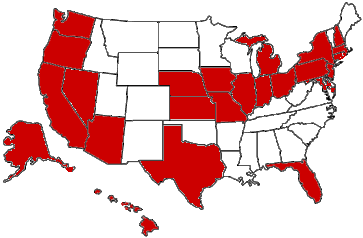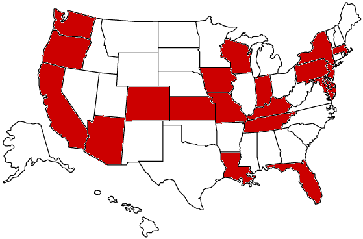Lawmakers in Massachusetts are hard at work trying to outlaw unlicensed broadcasting. H.1679 was introduced in the state House of Representatives in January and got a hearing in the legislature’s Joint Committee on the Judiciary just last week. Floor votes are expected before the end of the year.
If approved, Massachusetts would become the fourth state in the country to pass an anti-pirate radio law. Continue reading “Massachusetts Mulls Anti-Pirate Law”
Tag: florida
Pirate-Hunting: FCC Plods While Local Scenes Bubble
Halfway through 2013, and the FCC’s pace of unlicensed broadcast enforcement shows no real change from 2012: 106 enforcement actions in all, targeting more than three dozen stations, with the majority of this activity wholly administrative in nature. Pirate stations who appear on the FCC’s radar can now expect a warning letter to arrive via certified mail 1-6 weeks after an initial visit. Ignore those, and the agency may start asking for money.
 To date, the FCC has handed out $60,000 in Notices of Apparent Liability and $125,000 in actual forfeitures. However, not all of these penalties are new: in February, the FCC socked Whisler Fleurinor with a $25,000 fine for unlicensed operation in Fort Lauderdale, Florida. This is actually Fleurinor’s second go-round – he was first busted in 2010 and given a $20,000 forfeiture in 2011, which was later reduced to $500. It’s much the same story for Gary Feldman, who was first busted in 2004 for pirate broadcasting in Miami. He was caught again last year and fined $25,000 this year. Moreno’s 2004 forfeiture ($10,000) was never paid. Continue reading “Pirate-Hunting: FCC Plods While Local Scenes Bubble”
To date, the FCC has handed out $60,000 in Notices of Apparent Liability and $125,000 in actual forfeitures. However, not all of these penalties are new: in February, the FCC socked Whisler Fleurinor with a $25,000 fine for unlicensed operation in Fort Lauderdale, Florida. This is actually Fleurinor’s second go-round – he was first busted in 2010 and given a $20,000 forfeiture in 2011, which was later reduced to $500. It’s much the same story for Gary Feldman, who was first busted in 2004 for pirate broadcasting in Miami. He was caught again last year and fined $25,000 this year. Moreno’s 2004 forfeiture ($10,000) was never paid. Continue reading “Pirate-Hunting: FCC Plods While Local Scenes Bubble”
FCC Enforcement in 2012: Going Nowhere Fast
After plummeting in 2011, FCC enforcement against unlicensed broadcasting rebounded ever so slightly last year – but not in any meaningful fashion.
 About 100 pirate radio stations in 19 states had contact with the federales in 2012, resulting in 245 specific enforcement actions. Interestingly, the vast majority of these happened in the first half of the year; for some reason, enforcement activity took a nosedive in July and never recovered. Continue reading “FCC Enforcement in 2012: Going Nowhere Fast”
About 100 pirate radio stations in 19 states had contact with the federales in 2012, resulting in 245 specific enforcement actions. Interestingly, the vast majority of these happened in the first half of the year; for some reason, enforcement activity took a nosedive in July and never recovered. Continue reading “FCC Enforcement in 2012: Going Nowhere Fast”
ZoneCasting: Commercial Test in 2013
GeoBroadcast Solutions, developer of the "ZoneCasting" FM transmission system, will conduct a full-scale commercial test in Florida next spring or summer. The test-station will be WRMF, an independently-owned adult-contemporary music outlet in West Palm Beach.
Although the FCC has yet to grant experimental authorization for this test, GeoBroadcast and Palm Beach Broadcasting have already secured FM booster-transmitters and a simulcast coordination system from Harris and are negotiating tower leases for the boosters. Continue reading “ZoneCasting: Commercial Test in 2013”
FCC Enforcement: Questionably Redundant and Retributive
Two-thirds of 2012 is in the can, and the FCC seems to be adhering to its “new normal” when it comes to pirate radio enforcement. Field agents have conducted 183 enforcement actions as of the end of August – this is up from the 132 actions logged by this time a year ago, but well off the year-over-year record-breaking enforcement pace set between 2006 and 2010.
The FCC’s been involved in anti-pirate enforcement activity in 15 states and Puerto Rico so far this year, as opposed to more than two dozen states by this point in 2011. The hottest spots continue to be the New York metropolitan area as well as the state of Florida more generally. Continue reading “FCC Enforcement: Questionably Redundant and Retributive”
Miscellaneous News of Note
A crash-course in the dramaturgy of media studies has the mind fully occupied at the moment, but not quite busy enough to do other stuff quasi-related to this site: Continue reading “Miscellaneous News of Note”
Arbitron Accidentally Rates Pirates in Florida
The radio industry’s primary rating racket says it has to re-compute its ratings for last fall in the Orlando, Florida market. It’s not quite clear just how the error was found, but it’s not the first time this has happened: Tampa’s Party Pirate made the books in his market back in the late ’90s, and such blips have actually happened on and off for decades. Continue reading “Arbitron Accidentally Rates Pirates in Florida”
Enforcement Action Database Cracks 1,000 Actions
Just caught up on the FCC’s last two months of activity. It’s been a busy winter: 274 enforcement actions for 2006 and counting.
This includes fines, or threats of fines, of $10,000 against the transmitter-hosts of both microstations in San Diego, though escalating the enforcement process up to that level of severity remains mostly outside the FCC’s standard protocol (in related news, the agency’s Inspector General is planning an audit of its regulatory fee-collection process, something not done since 1999). Continue reading “Enforcement Action Database Cracks 1,000 Actions”
The State of Florida v. Rayon Payne, pt. ∞
Late last October, Rayon Payne was tooling along the highway in a friend’s car when the po-po rolled up and pulled them over. Both men were searched, and the cops found a loaded gun on Payne’s person. Payne was arrested and charged with carrying a concealed weapon. He wrote me shortly after it happened but I neglected to further publicize the incident – not like the man needs any more negative spin to his life’s story. Continue reading “The State of Florida v. Rayon Payne, pt. ∞”
State-Level Challenge to Florida's Anti-Pirate Law?
The only attempt made so far to challenge Florida’s law making radio piracy a state felony involves a petition from the American Radio Relay League asking the FCC to issue a declaratory ruling nullifying the state law on jurisdictional grounds. Although the FCC has been historically very aggressive in asserting its jurisdictional superiority when it comes to regulation of the airwaves, in the cases of Florida and New Jersey it’s looked the other way – the ARRL’s petition has languished in the FCC’s circular file for 19 months now.
But Rayon Payne, of all people, thinks Florida’s law can be successfully contested at the state level. He recently called the Florida Secretary of State’s office and asked for a license to broadcast. Payne’s premise is, if the state of Florida wants to assert some sort of policing authority over use the public airwaves, then it should include a licensing power as a part of that authority. Continue reading “State-Level Challenge to Florida's Anti-Pirate Law?”